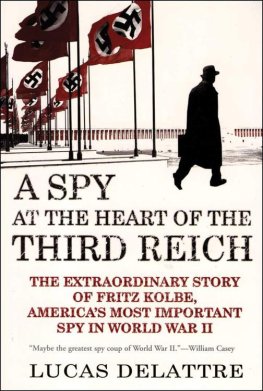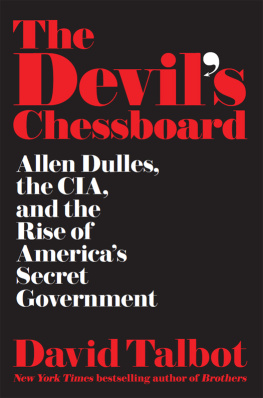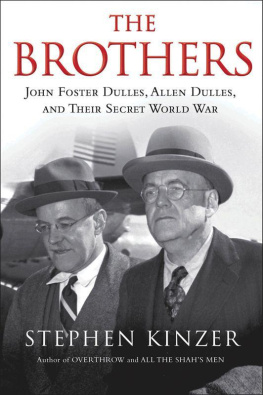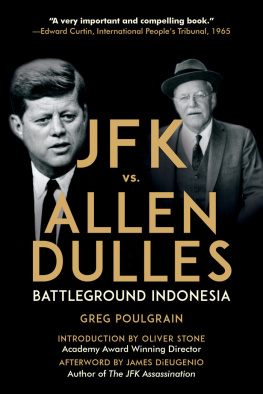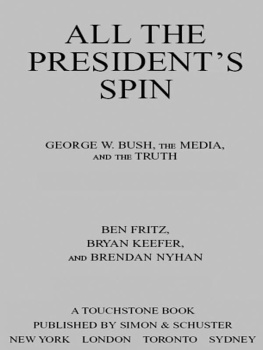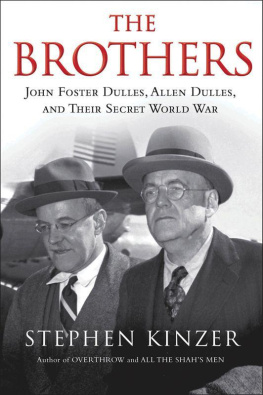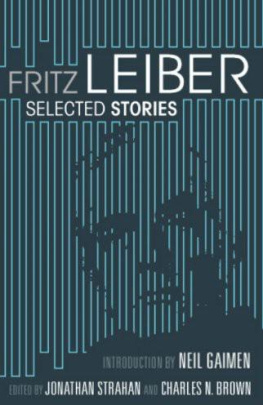A SPY AT THE HEART OF THE THIRD REICH
A SPY AT THE HEART OF THE THIRD REICH
A SPY AT THE HEART OF THE THIRD REICH
THE EXTRAORDINARY STORY OF FRITZ KOLBE, AMERICAS MOST IMPORTANT SPY IN WORLD WAR II
Lucas Delattre
Translated from the French by George A. Holoch, Jr.

Copyright 2003 by ditions Denol
Translation copyright 2005 by George A. Holoch, Jr.
All rights reserved. No part of this book may be reproduced in any form or by any electronic or mechanical means, including information storage and retrieval systems, without permission in writing from the publisher, except by a reviewer, who may quote brief passages in a review. Any members of educational institutions wishing to photocopy part or all of the work for classroom use, or publishers who would like to obtain permission to include the work in an anthology, should send their inquiries to Grove/Atlantic, Inc., 841 Broadway, New York, NY 10003.
Originally published in French under the title Fritz Kolbe: Un Espion au Coeur du IIIieme Reich by ditions Denol, Paris, France.
Published simultaneously in Canada
Printed in the United States of America
FIRST GROVE PRESS EDITION
Library of Congress Cataloging-in-Publication Data
Delattre, Lucas.
[Fritz Kolbe. English.]
A spy at the heart of the Third Reich : the extraordinary story of Fritz Kolbe,
Americas most important spy in World War II / Lucas Delattre.
p. cm.
Includes bibliographical references.
eBook ISBN-13: 978-0-8021-9649-1 (pbk.)
1. Kolbe, Fritz, 19001971. 2. World War, 19391945Secret service
United States. 3. World War, 19391945Germany. 4. Spies
GermanyBiography. I. Title.
D810.S8K5513 2005
94.54'8673'092dc22
[B] 2004057379
Grove Press
an imprint of Grove/Atlantic, Inc.
841 Broadway
New York, NY 10003
To Florence
CONTENTS
Denn die einen sind im Dunkeln
Und die andern sind im Licht.
Und man siehet die im Lichte
Die im Dunkeln sieht man nicht.
Some are out there in the darkness,
Others out there in the light.
If theyre in the light we see them,
In the dark theyre out of sight.
Bertolt Brecht, The Threepenny Opera
INTRODUCTION
In September 2001, the German weekly Der Spiegel published an article about Fritz Kolbe, whom it described as an anonymous hero of the Second World War. He was profiled as an example of those Germans who opposed Nazism and who fought with no internal or external help, driven solely by the stirrings of their conscience. Fritz Kolbe was an unknown minor official in the foreign ministry of the Nazi period, so one wonders how the two authors of the article, Alex Frohn and Hans-Michael Kloth, had discovered him. The answer lay in the archives of the Office of Strategic Services (OSS), the predecessor of the CIA, just opened by the United States government in June 2000. These documents, which had been inaccessible for more than fifty years, had just been declassified in accordance with a law passed under the Clinton presidency in 1998, the Nazi War Crimes Disclosure Act. They included 1,600 German diplomatic cables classified top secret that had been delivered to the Americans by Fritz Kolbe, alias George Wood, between 1943 and 1945.
To read these documents is to understand why Kolbe was described by Allied leaders in 1945 as the prize intelligence source of the war. In his memoirs, published in April 2003, Richard Helms, former director of the CIA, pays tribute to him by emphasizing that Kolbes information is now recognized as the very best produced by any Allied agent in World War II.
As Der Spiegel noted with surprise in September 2001, no one in his own country knew Fritz Kolbes name. This man, who had taken enormous risks to fight Nazism, had completely disappeared from German memory after 1945. German public opinion never recognized the merits of this traitor, even though the traitor had chosen the camp of democracy and freedom. To be sure, the official history of the Federal Republic of Germany (FRG) extols the virtues of a few illustrious opposition figures, such as Count Stauffenberg, originator of the failed assassination attempt against Hitler in July 1944. But it has no room for all those who, like Fritz Kolbe, demonstrated by their actions that everyone might have done something against Nazism. As George Steiner has said, the great nos to barbarism came from those so-called simple people. The article in Der Spiegel portrayed Fritz Kolbe as an ordinary German, the equivalent of Dutilleul, the hero of Marcel Ayms Passe-Muraille. However, if all the Reichs minor officials had, like him, attempted the impossible, Hitler doubtless would not have been in power for long.
PROLOGUE
In the second week of January 1944, President Franklin Delano Roosevelt was personally informed by General William J. Donovan, the head of the OSS, of the existence of a pro-American German spy in the heart of the Reich. We have secured through secret intelligence channels a series of what purport to be authentic reports, transmitted by various German diplomatic, consular, military, and intelligence sources to their headquarters. The source and material are being checked as to probable authenticity both here and in London. We shall submit later a considered opinion on this point. It is possible that contact with this source furnishes the first important penetration into a responsible German agency. General Donovans memorandum was dated January 10, 1944.
First important penetration behind the scenes of the Nazi regime: The announcement was calculated to give the White House great satisfaction. Since the United States had entered the war against Germany and Japan in December 1941, Washington had been trying to make up for lost time in the field of intelligence. The British secret services were far in advance of their American colleagues, who had in no way foreseen the Japanese attack on Pearl Harbor on December 7, 1941, an event that had been a wake-up call hastening the establishment of the OSS a few months later.
General Donovan had been given a free hand to construct a worldwide intelligence network, but he had no spies in either Germany or Japan. Of course, a few Germans spoke to Americans when they traveled abroad, but this was sporadic. There was no secret agent in Berlin or Tokyo: the risks of capture were too great, the prospects for success too slender. The principal source of available intelligence on the Axis powers was the decoding of intercepted enemy telegraph or telephone communications. This procedure could not replace the quality of human intelligence, which was extraordinarily difficult to obtain.
The ideal spy had perhaps just been unearthed in Berlin: No one could be more useful than a well-informed German official, close to the center of power and decision making, and inclined to transmit his knowledge on a regular basis. For all of these reasons, his subordinates felt that the president of the United States should be personally informed of the existence of a German agent working at the German Foreign Ministry. In his January 10, 1944 memo, the head of the OSS informed Roosevelt that these documents would thenceforth be classified under the title of Boston seriesa name that, like most used by the OSS, was probably chosen at randomand distributed to a very small number of people at the head of the government.
Attached to General Donovans memorandum were fourteen very brief notes developed on the basis of elements supplied by the enigmatic spy, notes that contained a certain number of greatly significant facts. One German diplomatic dispatch dated October 6, 1943 explained that the head of the Gestapo in Italy, SS-Obersturmbannfhrer Herbert Kappler, had ordered the deportation of the Jewish community of Rome to the north with a view to liquidating it. A message from Ernst von Weizscker (ambassador to the Vatican since the spring of 1943), dated December 13, 1943, reported a conversation with Pope Pius XII, who expressed the wish that Germany would hold out on the Russian front and hoped that peace was near or else communism would be the only winner. Still in Italy, Marshal Keitel (in the name of the fhrer) had given the order to execute without trial Italian officers who went over to the enemy (12 September 1943).
Next page







